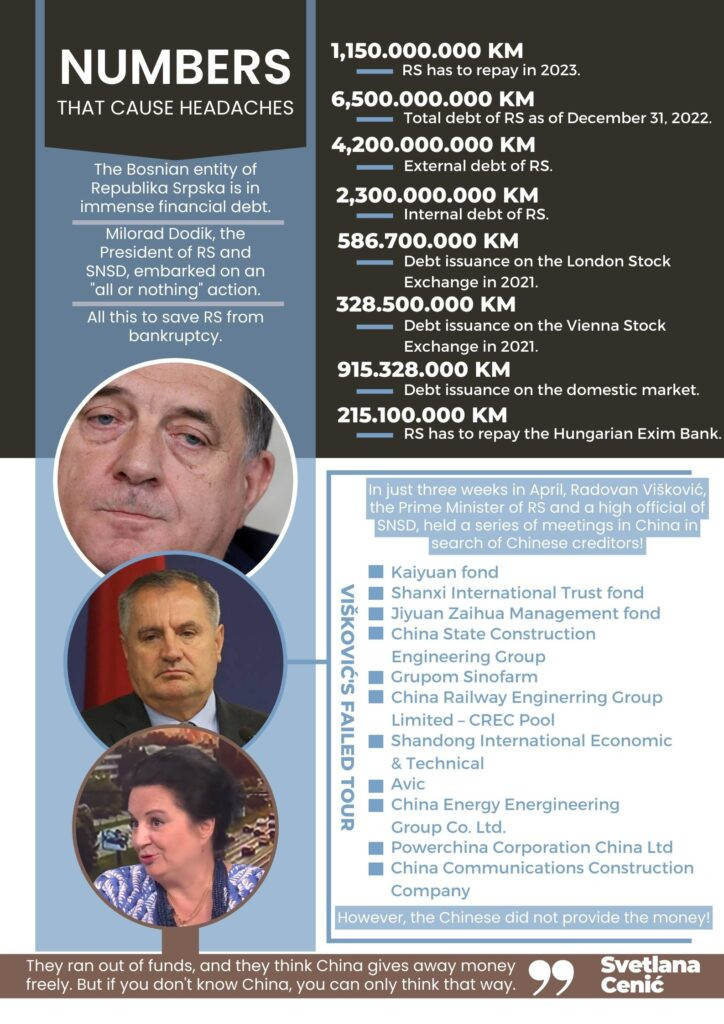Warnings hold no water: Dodik decided to hand over the resources of Republika Srpska “on a plate” to China

While the United States, and increasingly the European Union, see China's aspirations towards the Western Balkans as a danger manifested in unscrupulous business arrangements and the gradual imposition of a power foreign to liberal democracy, the authorities of Republika Srpska are offering almost all resources to China “on a plate”. We witness this almost daily.
Given that RS is in huge financial debt, the President of RS and the SNSD, Milorad Dodik, embarked on an “all or nothing” action to save RS from bankruptcy.
In just the period from April 6 to April 25, in less than three weeks, he conducted the largest diplomatic or political “offensive” aimed at China, at all costs, to obtain Chinese (lifesaving) credit facilities for the entity he leads.
Enormous Debts
This year, the entity of Republika Srpska (RS) is facing the unprecedented challenge of repaying a staggering 1.150 billion KM in debt! Moreover, the total external and internal debt of RS surpasses the actual budget, reaching a total of 6.5 billion KM as of December 31, 2022. According to official data from the Ministry of Finance and Treasury of Bosnia and Herzegovina, RS's external debt amounts to 4.2 billion KM, while the internal debt has climbed to 2.3 billion KM.
By rapidly accumulating debt in recent years, RS has now reached a point where its debt burden is on par with the Federation of Bosnia and Herzegovina (FBiH), whose total debt also stands at 6.5 billion KM. However, it's worth noting that RS's internal debt is twice as large as FBiH's internal debt.
According to official information on indebtedness from the document of the Ministry of Finance and Treasury of Bosnia and Herzegovina, Republika Srpska (RS) didn't only borrow 586.7 million KM through bonds on the London Stock Exchange in 2021. It also holds bonds on the Vienna Stock Exchange, with a debt totalling 328.5 million KM. Therefore, RS has accumulated a total of 915.328 KM in debt through so-called Eurobonds on the domestic level!
In addition to the mentioned debts, Republika Srpska (RS) is also obligated to repay 215.1 million KM to the Hungarian Export-Import Bank (Exim Bank) based on a previous arrangement.
During the span of just a few weeks in April, the Prime Minister of RS and high-ranking SNSD official, Radovan Višković, held meetings in China with representatives from Kaiyuan Fund, Shanxi International Trust Fund, and Jiyuan Zaihua Management Fund, seeking financial support from these Chinese funds.
The negotiations apparently did not result in immediate agreements, as further talks were announced to take place in Banja Luka in the coming period.
One day later, Višković met with representatives from China State Construction Engineering Group and the Chinese national pharmaceutical group Sinofarm during his visit to China. On April 8th, he also had discussions with representatives from China Railway Engineering Group Limited (CREC).
It's worth noting that CREC recently secured a contract from RS for the construction of a 17-kilometre highway section from Bijeljina to Brčko, as previously reported by Fokus.
On the same day, he also met with representatives of the company Shandong International Economic & Technical, and then with the representatives of the Chinese National Aero-Technology Corporation (AVIC). The day after, he met with representatives of China Energy Engineering Group Co. Ltd. From April 9 to April 12, he met with the executives of Powerchina Corporation of China Ltd, and the company for communications and construction (China Communications Construction Company – CCCC).
No Bonds in Sight
According to sources of Žurnal from the Government of Republika Srpska, Višković was, in fact, Milorad Dodik's emissary in China, attempting to ascertain whether Chinese investors were interested in purchasing entity bonds in the amount of 165 million euros.
However, the Chinese, as mentioned in the same article, showed no interest in this matter, as this amount is just a drop in the ocean compared to their numerous financial transactions. Moreover, their procedures are very slow, and the whole process would have taken months, which the Government of Republika Srpska did not have time for.
“They ran out of money and think that China is giving it away generously. However, those who don't understand China can only think that way. China doesn't work like that, and that amount is small for them. Additionally, when China invests abroad and makes a profit, they tend to keep it overseas, not repatriate it, for a straightforward reason. It's not an altruistic venture; instead, those foreign currency reserves go to the People's Bank of China, where they are exchanged for local currency. Therefore, it's a banking or investment rationale,” said economic expert Svetlana Cenić for Fokus magazine.
Zoran Pavlović, a business advisor and economic analyst, told our portal that Višković's trip to China was mainly related to business arrangements for the construction of the “Dabar” hydropower plant, for which a contract was signed eight years ago but has not yet started implementation.
“As things stand, it seems that their bank has accepted guarantees from the Government of Republika Srpska to resume work. That's the principle of Chinese companies – you pay 15 per cent upfront, and the rest is covered by a guarantee. By definition, the Chinese work with state guarantees; they haven't dealt with bonds as a guarantee for the entity, but it seems they have accepted that now. The Chinese are doing what Yugoslavia used to do in Africa,” emphasized Pavlović.
SNSD and the Communist Party of China
On the territory of Bosnia and Herzegovina, Dodik and his party colleagues have intensified their efforts, like never before, to strengthen political and all other relations with China. On April 24th, a meeting between delegations of the SNSD and the Communist Party was held in East Sarajevo, where a “strategic partnership” between the two political parties was confirmed.
The SNSD delegation was led by Staša Košarac, who, just one day earlier, decided not to attend the Energy Summit in Neum, organized by the US Embassy in Bosnia and Herzegovina. Košarac confirmed that he made this decision in accordance with the decision of the Government of Republika Srpska (RS), which requested institutions of RS and its representatives in institutions at the state level to terminate cooperation with the US and UK embassies.
During the mentioned meeting on April 24th, it was emphasized the commitment to strengthen the strategic partnership between the two political parties, which was formally established in 2016. Back in 2016, Dodik officially solidified the cooperation between the SNSD and the Communist Party in Beijing.
It is less known to the public that the Party of Democratic Action (SDA) also established cooperation with the Communist Party of China in the same year, but it was far less fruitful compared to the SNSD.
Moreover, after the October Congress, the Communist Party of China initiated a new dimension of confrontation in its relations with the US, which was particularly evident during the release of spy balloons that were shot down in the US airspace.
The Stance of the US Congress
Several months ago, the US House of Representatives established the Select Committee on Strategic Competition with the People's Republic of China, and in early March, it held a high-profile hearing titled “The Threat of the Chinese Communist Party to America.”
In this current situation between the US and China, or perhaps because of it (given that the Government of Republika Srpska has officially decided to terminate cooperation with the US Embassy in Bosnia and Herzegovina), Dodik is attempting to further approach this Far East country.
So, on his own, the day after the meeting between the delegations of SNSD and the Communist Party of China on April 25th, Dodik met with representatives of the China Road and Bridge Corporation (CRBC) in Banja Luka and signed a memorandum of understanding and cooperation on highway construction projects in Republika Srpska.
By doing so, he opened up the possibility for new contracts on new infrastructure projects in Republika Srpska to be awarded to Chinese companies, especially at a time when the current construction of three segments of the Banja Luka – Prijedor, Vukosavlje – Brčko, and Brčko – Bijeljina highways is exclusively undertaken by Chinese firms.
Commenting on the allocation of contracts to Chinese companies on some highway segments, Cenić highlighted the example of the Banja Luka – Prijedor segment, where the contract is still kept secret from the public.
''Under our laws, something funded by taxpayers’ money cannot be classified as confidential. Anyone operating within this country must respect its laws, not follow the laws or business policies of their own country. It raises questions for the domestic side – by what right and under which law? Where is the transparency? These are taxpayer funds'', says Cenić.
Blacklists
In addition to the current political and other hostilities between Dodik and China towards the United States, it is interesting to note that on April 24th, two political parties whose officials are on the U.S. blacklist or the U.S. Department of the Treasury have deepened their cooperation. In the case of SNSD, these officials are Milorad Dodik and Nikola Špirić.
In 2020 and 2021, a number of Communist Party of China officials were also added to the U.S. blacklist. These officials include Chen Quanguo, Zhu Hailun, Wang Mingshan, Huo Liujun, Wang Junzheng, and Chen Mingguo.
All of this occurred during Donald Trump's presidency as the U.S. president, and then-U.S. Secretary of State Mike Pompeo officially proclaimed that “The People's Republic of China, under the leadership and control of the Chinese Communist Party (CCP), has committed crimes against humanity, predominantly against Uighur Muslims, but also against other ethnic and religious minority groups in Xinjiang.”
“I have determined that the People's Republic of China, under the leadership and control of the Chinese Communist Party, has committed genocide against the predominantly Muslim Uighurs and other ethnic and religious minority groups in Xinjiang,” Pompeo stated at that time.
The European Parliament also precisely identified the leadership of the Chinese Communist Party in activities directed towards crimes against the Uighurs in resolutions adopted in 2020 and 2021.
However, all the aforementioned, including the fact that nine years after committing to the construction of an expensive highway built by the Chinese, Montenegro nearly went bankrupt, does not represent any warning signals for the authorities of Republika Srpska. At the time of writing this text, the authorities of this entity are desperately trying to negotiate new arrangements with China, seemingly disregarding the risks involved.




